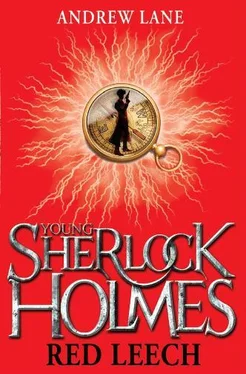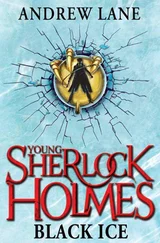During the fifth day of the voyage, during a break from his almost incessant violin practice, Sherlock spent some time at the bows of the ship, leaning on the rail and staring ahead at the distant blue line of the horizon.
He was not alone. Several other passengers were also in the bows of the boat, watching the wind and the waves and the clouds. Perhaps even watching for land, although it was far too early for that. Maybe the Captain’s stories about great storms and monstrous sea creatures had fired their imaginations and they were watching out for the first sight of something out of the ordinary. As far as Sherlock was concerned they were more likely to see a drifting iceberg.
One man,wrapped in an overcoat against the cold wind, attracted Sherlock’s attention. He had a trim black beard which curled out at the edges and a moustache which had been waxed so that it curled up at the ends. Instead of staring out across the ocean ahead, he had his back to it and was scribbling lines in a notebook with a pencil.
In fact, as he watched, Sherlock realized that the man was not scribbling lines but sketching something. Sherlock shifted his position, trying to see what the man was drawing, but all he could see on the paper of the man’s notebook was a cylindrical object with pointed ends, something like a fat cigar. It seemed to be separated into sections by some internal walls, or barriers.
“You are interested in my drawing, yes?” the man said, glancing up. His voice had a strong accent: German, Sherlock thought.
“Sorry,” Sherlock said, blushing. “I just wondered why you weren’t looking ahead, like everyone else.”
“I am looking ahead,” the man said. “A long way ahead, to a time when journeys such as ours are conducted not by boats, which are subject to storms and waves, but by balloon.”
“Balloon?” Sherlock echoed. He nodded towards the sketch in the notebook. “Is that what that is?”
The man stared at Sherlock critically. “I think you are unlikely to be an industrial or a military spy,” he said. “Too young. And your face tells me that you have an open mind and a keen intellect, which is not my experience of spies.” He laughed, although it was more of a snort than a laugh. “I have been... criticized... in my own country for my ideas. I am hoping that in America, things will be different.”
“I’m Sherlock Holmes.” Sherlock extended his right hand. “Pleased to meet you.”
And I am Ferdinand Adolf Heinrich August Graf von Zeppelin,” the man said, bowing stiffly, then extending his hand to shake Sherlock’s hand. “In your country, I would be referred to as Count Zeppelin. You may just refer to me as “Count”.” He turned his notebook around so that Sherlock could see it. “Now, tell me — can you conceive of a gigantic balloon made of varnished silk braced with hoops of some kind, a rigid airship, if you will, filled with a gas that is lighter than air and flying across the ocean at a height such that below the balloon you see clouds, not waves?”
“What gas would you use?” Sherlock asked.
The Count nodded. An excellent question. The French have been using hot air for smaller balloons, although I cannot see that working for larger ones, and the American Army have had good results with coke gas, which is derived from burning coal. I would favour hydrogen, if it could be purified enough.”
And how would you move the balloon?” Sherlock was fascinated by this strange man’s ideas. “Surely balloons would just float off?”
“This ship on which we find ourselves does not just float. It moves. It has engines. It has paddles. If paddles can move a ship through the water then they could move a balloon through the air.”
Sherlock looked at him dubiously. Are you sure that would work?”
Von Zeppelin smiled coldly. “I have conducted an extensive study of lighter-than-air flight. Four years ago I was in America, acting as an observer for the Northern Potomac Army in their war against the Confederate States. While I was there I made my first ascent in a tethered reconnaissance balloon. I also met Professor Thaddeus Lowe, who is probably the world’s greatest expert on lighter-than-air flight.” Von Zeppelin’s rather rigid face seemed to light up when he talked about balloons. It was obvious to Sherlock that the subject enthused him. “Professor Lowe had previously built a balloon intended for transatlantic flight, just like this ship, which he named the Great Western. It was 103 feet in diameter and could lift twelve tons. Before the war, he used it to make a successful flight from Philadelphia to New Jersey, but his first attempt to cross the Atlantic was halted when its skin was ripped open by a wind.” He shrugged. “The start of the war meant that Professor Lowe’s plans were halted. He formed the Union Army Balloon Corps at the express request of President Lincoln. Wars are strange things. On the one hand they drag men of intellect away from their pursuit of progress, but on the other hand they also accelerate the need for progress, Without the War Between the States, would the President have been interested in the possibilities of balloons?”
“Sherlock!"
The voice was female, and young. It was Virginia. Sherlock turned, to see her standing a little way off, in the lee of a lifeboat. She was still looking pale, but she was smiling.
“Excuse me,” he said to the Count. “I need to go.”
The Count bowed stiffly again. “Of course. The fair sex takes precedence over everything.”
Are you married?” Sherlock asked.
“I am engaged to be married,” von Zeppelin said. His stern face lit up as he smiled. “Her name is Isabella Freiin von Wolff, from the house of Alt-Schwanenburg, and she is the most beautiful woman in the world.” He glanced towards Virginia, then back to Sherlock. Although you would not think so, I think.”
Sherlock smiled at him. He quite liked the German Count.
“I’ll see you later,” he said.
“It is a small ship,” the Count replied, “and there are only so many of us on board. We are bound to bump into each other again.”
Leaving the Count behind, Sherlock walked towards Virginia.
“I was afraid you were going to spend the entire voyage in your cabin,” he said awkwardly.
“So was I,” she replied. “I hate bein’ cooped up in a small room, but I don’t see as I had much choice.” She blushed, the colour suddenly flooding into her pale cheeks, and she looked away. “I guess... I guess my pa told you that this voyage reminded me too much of the last voyage we took together, when my ma died.”
“He did,” Sherlock confirmed.
“And, to make it worse, I get seasick. You wouldn’t believe that someone who rides a horse could get seasick, but I’ve been as sick as a dog.”
He couldn’t help smiling. That complete honesty was one of the things he liked most about Virginia. No English girl would have dreamed of discussing matters of the stomach like that.
“How are you feeling now?” he asked.
“The lady I’m sharing a cabin with made me some herbal tea. This is the first day I’ve managed to keep any down, but I think it’s helping.”
“I’m sorry about your mother,” he said awkwardly. “And I’m sorry this trip reminds you of her. I think being in England keeps on reminding you of her.”
“It does.” She paused, “I don’t know if she was ill when she boarded, or whether she caught somethin’ on board, but she was mightily sick for a whole week. She got thinner an’ thinner, and whiter an’ whiter, an’ then she just slipped away.” A tear slid from her eye and began a slow trickle down her cheek. “They buried her at sea. The Captain said he couldn’t keep her body on board, not for the rest of the voyage, so they wrapped her in a canvas sheet an’ said some pretty words an’ then just tipped her over the side. That’s the worst thing. I haven’t even got a grave I can visit.” She gestured with her open palm at the expanse of ocean. “Just this.”
Читать дальше












